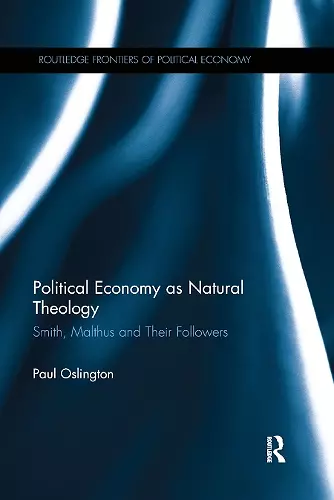Political Economy as Natural Theology
Smith, Malthus and Their Followers
Format:Paperback
Publisher:Taylor & Francis Ltd
Published:12th Dec '19
Currently unavailable, and unfortunately no date known when it will be back
This paperback is available in another edition too:
- Hardback£160.00was £160.00(9780415454810)

Since the early 20th century, economics has been the dominant discourse in English-speaking countries, displacing Christian theology from its previous position of authority. This path-breaking book is a major contribution to the interdisciplinary dialogue between economics and religion.
Oslington tells the story of natural theology shaping political economy in the late 18th and early 19th centuries, emphasising continuing significance of theological issues for the discipline of economics. Early political economists such as Adam Smith, Josiah Tucker, Edmund Burke, William Paley, TR Malthus, Richard Whately, JB Sumner, Thomas Chalmers and William Whewell, extended the British scientific natural theology tradition of Francis Bacon, Robert Boyle and Isaac Newton to the social world. This extension nourished and shaped political economy as a discipline, influencing its theoretical framework, but perhaps more importantly helping legitimate political economy in the British universities and public policy circles. Educating the public in the principles of political economy had a central place in this religiously driven program. Natural theology also created tensions (especially reconciling economic suffering with divine goodness and power) that eventually contributed to its demise and the separation of economics from theology in mid-19th-century Britain. This volume highlights aspects of the story that are neglected in standard histories of economics, histories of science and contemporary theology.
Political Economy as Natural Theology is essential reading for all concerned with the origins of economics, the meaning and purpose of economic activity and the role of religion in contemporary policy debates.
'Oslington’s work adds clarity to the ongoing battle among intellectual historians for the right to narrate the history of economic thought. In a world where economic principles are often endowed with ‘natural’ authority, people on both ends of the economic spectrum have something to gain by claiming thinkers such as Adam Smith as their intellectual ancestors. As an expert in the ongoing dialogue between economics and Christian theology, Oslington is uniquely placed to explore this foundational period of economic tradition.' Kathryn D. Blanchard, Alma College
"The last two decades have seen a notable “turn to religion,” as it has been called in a
variety of academic disciplines, including economics. Part of this movement is
increased attention to the relationship between economics and religion, and particu>larly theology, from a historical perspective. Paul Oslington’s work on theology
and economics, including an earlier edited volume (Adam Smith as Theologian),
stands at the forefront of this revisionist program, which aims both to more properly
ground historical understandings of the origins of political economy as well as to use
that grounding as a way to begin to reconcile—if not reunite—theology and political
economy."
—Jordan J. Ballor, HOPE reviews
ISBN: 9780367865023
Dimensions: unknown
Weight: 320g
164 pages